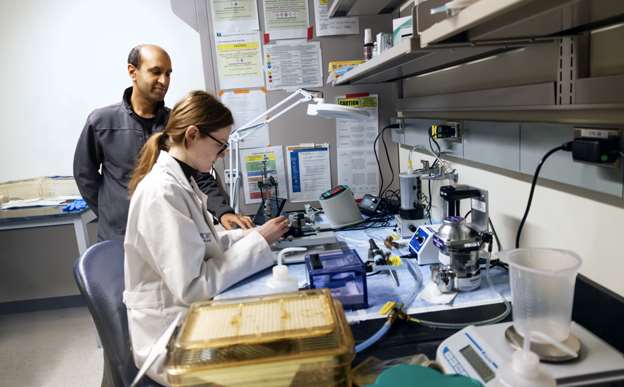About the Gupta Lab

Gupta Lab Research
Current Projects
Facilities
Current Lab Members
The Gupta Lab is led by Dr. Kunal Gupta, a clinician researcher with a focus on the development of epilepsy.

Kunal Gupta, MD, PhD, FAANS
Assistant Professor

Cora Helton
MSTP Graduate Student

Nicole Rodgers
Research Technologist I
Collaborative Investigators
The Gupta Lab works closely with collaborators at the Medical College of Wisconsin, Indiana University School of Medicine, and the University of North Carolina School of Medicine. Collaborators of the Gupta Lab offer a wide variety of expertise, with specializations including neurosurgery, head-and-neck surgery, psychiatry, plethysmography, neuron tracing and biomedical engineering.

Antje Kroner-Milsch, MD, PhD
Associate Professor, Department of Neurosurgery; Associate Director, Neuroscience Research Center

Matthew R. Hodges, PhD, FAPS
Professor and Eminent Scholar; Director of Graduate Studies

Rita Patel, PhD
Associate Professor of Speech, Language and Hearing Sciences

Hernan G. Rey, PhD
Assistant Professor, Department of Neurosurgery; Joint Department of Biomedical Engineering

Amol Yadav, PhD
Assistant Professor of Neurosurgery
Collaborative Programs

Comprehensive Epilepsy Care
The Froedtert & the Medical College of Wisconsin Comprehensive Epilepsy Program provides world-class care to patients with seizures and related conditions.
Learn more about the Froedtert & MCW Comprehensive Epilepsy Program
Parkinson's & Movement Disorders
The Froedtert & the Medical College of Wisconsin Parkinson's and Movement Disorders Program is dedicated to improving the lives of people with movement disorders.
Learn more about the Froedtert & MCW Parkinson's & Movement Disorders Program
Recent Publications
-
(Pandya V, Janecek JK, LaRocque JJ, Thompson S, Bauer P, Vuppala A, Anderson C, Noviawaty I, Binder JR, Gupta K, Lew S, Mueller W, Greene C, Oleksy A, Swanson SJ, Carlson C, Raghavan M.) Epilepsy Behav. 2026 Feb 19;178:110963 PMID: 41719740 SCOPUS ID: 2-s2.0-105030272362 02/21/2026
-
Effects of Deep Brain Stimulation on Adductor Laryngeal Dystonia.
(Patel RR, Stall M, Halum S, Anthony B, Parker N, Reese M, Kareken D, Dickinson S, Witt TC, Purger DA, Gupta K, Zauber SE.) Laryngoscope. 2026 Feb 16 PMID: 41693579 02/16/2026
-
(Bieber D, Gupta K, Abdallah R, Abd-Elsayed A, Engle A, Duff I, Hoffman D, Kalia H, Rosenow J, Macken M, Raslan AM, Slavin K, Tennant A, Raskin JS.) Neuromodulation. 2025 Jun;28(4):551-557 PMID: 39969456 SCOPUS ID: 2-s2.0-85217976989 02/19/2025
-
(Helton C, Rodgers N, Klosa P, Van Newenhizen E, Hodges M, Jones M, Gupta K.) MethodsX. 2025 Jun;14:103106 PMID: 39790365 PMCID: PMC11714666 01/10/2025
-
Spinal cord stimulation restores locomotion in a Parkinson's disease patient and rodents
(Slack JC, Rees B, Borda E, Slack J, Nicolelis MAL, Zauber SE, Gupta K, Yadav AP.) Brain Stimulation. 1 September 2025;18(5):1407-1422 SCOPUS ID: 2-s2.0-105012757102 09/01/2025
-
Spinal cord stimulation restores locomotion in a Parkinson's disease patient and rodents.
(Slack JC, Rees B, Borda E, Slack J, Nicolelis MAL, Zauber SE, Gupta K, Yadav AP.) Brain Stimul. 2025;18(5):1407-1422 PMID: 40759323 SCOPUS ID: 2-s2.0-105012757102 08/05/2025
-
(Helton C, Rodgers N, Klosa P, Van Newenhizen E, Hodges M, Jones M, Gupta K.) Methodsx. June 2025;14 SCOPUS ID: 2-s2.0-85211994176 06/01/2025
-
(Patel R, Burroughs L, Higgins A, Zauber SE, Isbaine F, Schneider D, Hohman R, Gupta K.) Neurosurgery. 2024 Oct 01;95(4):915-923 PMID: 38787392 SCOPUS ID: 2-s2.0-85204179286 05/24/2024
-
(Mardones MD, Rostam KD, Nickerson MC, Gupta K.) Exp Neurol. 2024 Jun;376:114767 PMID: 38522659 PMCID: PMC11058011 SCOPUS ID: 2-s2.0-85188911182 03/25/2024
-
Insights into epileptogenesis from post-traumatic epilepsy.
(Pease M, Gupta K, Moshé SL, Correa DJ, Galanopoulou AS, Okonkwo DO, Gonzalez-Martinez J, Shutter L, Diaz-Arrastia R, Castellano JF.) Nat Rev Neurol. 2024 May;20(5):298-312 PMID: 38570704 PMCID: PMC12257072 SCOPUS ID: 2-s2.0-85189313072 04/04/2024
-
(Mardones MD, Rostam KD, Nickerson MC, Gupta K.) Experimental Neurology. June 2024;376 SCOPUS ID: 2-s2.0-85188911182 06/01/2024
-
(Budnick HC, Schneider D, Zauber SE, Witt TC, Gupta K.) World Neurosurg. 2024 Jan;181:e346-e355 PMID: 37839566 SCOPUS ID: 2-s2.0-85176141861 10/16/2023
Get Involved with the Gupta Lab
Research Rotations
Medical Students accepting a research rotation in the Gupta Lab will gain experience in stereotactic surgery, transgenics, viral gene modulation, electrocorticography, and a variety of molecular biology techniques. The appropriate candidate will have an interest epilepsy, neurosurgery, or general surgery.
Graduate Education
The Gupta Lab accepts graduate students seeking MS and PhD degrees at the Medical College of Wisconsin who are interested in cellular remodeling and epileptic seizures.
Undergraduate Opportunities
Through the Summer Program for Undergraduate Research, also known as SPUR, undergraduate students will make real contributions to science and humanity while working alongside Dr. Gupta and his team on research projects integrating neuroscience and epilepsy.






.png?la=en&scale=both&anchor=middlecenter&h=116&mode=max&w=280&hash=B36D806E60C41416DAA0A965D2A283E8)